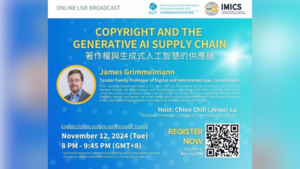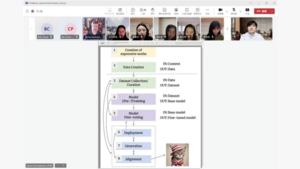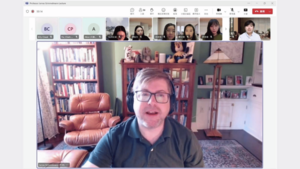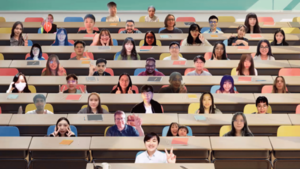AI Meets the Law: Cornell Tech Professor Explores Generative AI's Copyright Challenges




Date :
2025-01-02
Department :
Master’s Program in Global Communication and Innovation Technology
【Article by GCIT】
On November 12, 2024, Professor James Grimmelmann, a distinguished legal scholar from Cornell Tech, delivered a virtual lecture hosted by the College of Communication at National Chengchi University (NCCU). The lecture focused on the intersection of generative artificial intelligence (AI) and copyright law, providing valuable insights and research findings on this emerging topic.
The event was moderated by Assistant Professor Jesse Lu from the College of Communication and co-organized by the International Master’s Program in International Communication Studies (IMICS) and the Master's Program in Global Communication and Innovation Technology (GCIT). It attracted nearly 50 participants from 15 countries, including experts and officials from Taiwan's National Communications Commission (NCC), the Ministry of Justice, the National Taiwan University of Science and Technology, National Chung Cheng University, and Chung Yuan Christian University. Attendees also included representatives from China, Taiwan, Hong Kong, Malaysia, Thailand, Singapore, Vietnam, India, the United States, Russia, France, the Netherlands, Germany, Portugal, and Paraguay.
Professor Grimmelmann, a distinguished faculty member at Cornell Tech, holds a J.D. from Yale University and a B.A. in Computer Science from Harvard University, which gives him a unique interdisciplinary perspective. His research examines the regulatory role of law in software development and the societal effects of technology on the distribution of freedom, wealth, and power. During his lecture, Professor Grimmelmann delivered a detailed technical analysis of the distinctive features of generative AI.
“Generative AI is fundamentally different from traditional AI,” Grimmelmann explained. Traditional AI mainly focuses on tasks like image classification and recognition, while generative AI utilizes vast datasets to create original content. This dependence on large-scale databases highlights its remarkable ability to produce coherent and predictive outputs, but it also brings about unique challenges for copyright law.
Grimmelmann addressed the complexities of copyright issues, particularly "substantial similarity." Traditional copyright law assesses the similarities between derivative works and their original counterparts. However, with generative AI, the intricate data processing and transformation involved create a complicated relationship between the final outputs and the original training data, which presents significant copyright identification and protection challenges.
During the discussion, international participants engaged in lively debates about essential matters, including legal frameworks for AI-generated content, the positions of major technology companies on copyright issues, and strategies for balancing technological innovation with the protection of human rights.
Grimmelmann emphasized the necessity of establishing clear legal frameworks and industry guidelines to tackle the challenges posed by generative AI. “We need to protect the rights of creators while allowing space for AI-driven innovation,” he stated. He argued that achieving this delicate balance will be a crucial focus for the evolution of copyright law in the coming years.
The event highlighted the academic community's increasing attention to AI governance and provided a vital framework for understanding generative AI's legal and ethical implications. By fostering international academic dialogue, the event offered diverse perspectives and potential solutions for addressing copyright challenges in the age of AI.
[此中英文稿和圖片以及全球傳播與創新科技碩士學位學程均獲得中華民國文化部的補助。]
On November 12, 2024, Professor James Grimmelmann, a distinguished legal scholar from Cornell Tech, delivered a virtual lecture hosted by the College of Communication at National Chengchi University (NCCU). The lecture focused on the intersection of generative artificial intelligence (AI) and copyright law, providing valuable insights and research findings on this emerging topic.
The event was moderated by Assistant Professor Jesse Lu from the College of Communication and co-organized by the International Master’s Program in International Communication Studies (IMICS) and the Master's Program in Global Communication and Innovation Technology (GCIT). It attracted nearly 50 participants from 15 countries, including experts and officials from Taiwan's National Communications Commission (NCC), the Ministry of Justice, the National Taiwan University of Science and Technology, National Chung Cheng University, and Chung Yuan Christian University. Attendees also included representatives from China, Taiwan, Hong Kong, Malaysia, Thailand, Singapore, Vietnam, India, the United States, Russia, France, the Netherlands, Germany, Portugal, and Paraguay.
Professor Grimmelmann, a distinguished faculty member at Cornell Tech, holds a J.D. from Yale University and a B.A. in Computer Science from Harvard University, which gives him a unique interdisciplinary perspective. His research examines the regulatory role of law in software development and the societal effects of technology on the distribution of freedom, wealth, and power. During his lecture, Professor Grimmelmann delivered a detailed technical analysis of the distinctive features of generative AI.
“Generative AI is fundamentally different from traditional AI,” Grimmelmann explained. Traditional AI mainly focuses on tasks like image classification and recognition, while generative AI utilizes vast datasets to create original content. This dependence on large-scale databases highlights its remarkable ability to produce coherent and predictive outputs, but it also brings about unique challenges for copyright law.
Grimmelmann addressed the complexities of copyright issues, particularly "substantial similarity." Traditional copyright law assesses the similarities between derivative works and their original counterparts. However, with generative AI, the intricate data processing and transformation involved create a complicated relationship between the final outputs and the original training data, which presents significant copyright identification and protection challenges.
During the discussion, international participants engaged in lively debates about essential matters, including legal frameworks for AI-generated content, the positions of major technology companies on copyright issues, and strategies for balancing technological innovation with the protection of human rights.
Grimmelmann emphasized the necessity of establishing clear legal frameworks and industry guidelines to tackle the challenges posed by generative AI. “We need to protect the rights of creators while allowing space for AI-driven innovation,” he stated. He argued that achieving this delicate balance will be a crucial focus for the evolution of copyright law in the coming years.
The event highlighted the academic community's increasing attention to AI governance and provided a vital framework for understanding generative AI's legal and ethical implications. By fostering international academic dialogue, the event offered diverse perspectives and potential solutions for addressing copyright challenges in the age of AI.
[此中英文稿和圖片以及全球傳播與創新科技碩士學位學程均獲得中華民國文化部的補助。]


 Fax:886-2-29379611
Fax:886-2-29379611